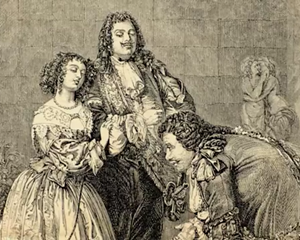Hey there! I'm Mike Rugnetta, this is Crash Course Theater,
嘿 大家好 我是迈克·鲁格内塔 这里是“戏剧速成课堂”
and today's episode will take place in one location, in one revolution of the sun, and involve only one plot.
今天本集要讲的戏剧:剧情只能发生在一个地方、太阳只能公转一圈、只能有一条情节线
Because we're in early modern France. And if there's one thing the French love, it's raw milk cheese, and rules.
因为我们要讲的是现代法国早期的戏剧 如果说有那么一样东西是法国人喜欢的 那么这个东西肯定是生奶酪 和规则
OH, right, and fashion. Good one, Cue Ball.
喔 对的 还有时尚 说得好 主球
Today we'll be looking at the French embrace of neoclassicism, the playwrights who rocked it, and Le Cid,
今天我们来看看法国的新古典主义、法国新古典主义时期的剧作家、还有戏剧作品《勒熙德》
the play that scandalized France by following neoclassical rules in weird, absurd and possibly immoral ways.
这部戏剧以其怪异、荒谬、甚至不道德的方式遵循着新古典主义的规则并曾在法国叱咤风云
Allons-y!
我们开始吧(法语)!
The Renaissance arrived pretty late in France.
文艺复兴在法国出现得很晚
After political upheaval and religious wars, the country finally settled down in the late sixteenth and early seventeenth centuries
在经历了政治动荡和宗教战争之后 法国终于于16世纪晚期至17世纪早期
with the help of the boy kings Louis XIII and Louis XIV alongside their ministers, Cardinal Richelieu and Cardinal Mazarin.
在路易十三、路易十四、还有他们的大臣 即两大红衣主教黎塞留和马扎林的治理下安定下来
All were enthusiastic proponents of the theater. Yay!
这些人都是戏剧的忠实支持者 耶!
Still, French playwriting had a slow start.
虽然如此 法国戏剧的起步还是比较晚的
Editions of Terence appeared late in the fifteenth century, followed by translations of Greek tragedies and Aristotle's Poetics.
特伦斯的法语版本出现于15世纪晚期 之后是希腊悲剧和亚里士多德诗学的翻译版
A few playwrights tried out some Latin dialogues, and a couple of Seneca adaptations began to circulate.
一些剧作家尝试过拉丁语对白 塞内加的一些改编作品也开始流传
Turns out, authors and intellectuals needed about a century to think about Classical Drama before they began writing Neoclassical drama.
事实证明 作家和知识分子在开始创作新古典主义戏剧之前 需要花一个世纪的时间来研究古典主义戏剧
And the result of all that thinking? That's right: rules.

The French framework for neo-classical drama first arose around 1550, when a group of seven French authors called Le Pleiade set up some rules for writing.
新古典主义戏剧的法国框架最早出现于1550年左右 当时有一个由七名法国作家组成的名为“七星诗社”的团体为写作制定了一些规则
Many of their ideas were absorbed by the Academie Francaise, founded in 1636, which created more rules.
他们的许多想法被成立于1636年的法兰西学院所吸收 之后该学院制定了更多的规则
Following Le Cid—which we'll talk about in a moment—the Academy standardized their system, and articulated five main rules for plays, allegedly based on classical models.
在《勒熙德》(我们之后会讨论到)之后 学院规范了他们的体系 并明确阐述了戏剧的五大规则 据说是基于古典主义的模式
Here are your neoclassical must-haves: Number One: Verisimilitude.
以下是新古典主义必须遵循的规则:第一点:真实性
This means that the action onstage must be believable.
就是说舞台上的动作必须是真实可信的
No gods cruising through to solve everything, no ghosts, no monsters, or satyrs with enormous phalli.
没有什么"神随随便便就能解决一切问题" 没有鬼魂 没有怪物 也没有长着巨大阴茎的色情狂
And Yorick, I hate to break this to you, but no soliloquies.
尤里克 虽然我很不想告诉你这个 但是 没有独白
Breaking the fourth wall and talking directly to the audience? That is UNBELIEVABLE.
打破第四堵墙 直接和观众对话?难以置信
So instead we start getting a lot of friends and maids as sounding boards.
所以取而代之的是 开始向很多朋友和女佣询问意见
Plays are still in verse, though and still depict some pretty outrageous situations.
戏剧依然是诗体 尽管如此 还是能刻画出一些粗暴的场景
But they don't violate spectators' sense of what should happen.
而且没有违背观众的预期
Which brings us to NUMBER TWO, Decorum.
这就引出了第二点:礼仪
From Horace, the Academy takes the idea that drama has to teach and please.
学院采取了贺拉斯的观点:戏剧必须有教育意义和娱众意义
And not from Horace, that plays should uphold and promulgate French morals.
还有不是贺拉斯的观点:即戏剧应该维护和传播法国的道德
Good people have to be rewarded. Bad people have to be punished. No defaming people a La Aristophanes. And no violence. It's tacky.
好人要有回报、坏人必须受到惩罚、不能像阿里斯托芬那样诽谤他人、不能有暴力 要求很苛刻
NUMBER THREE: No mixing of dramatic styles. Comedies are funny. Tragedies are sad. That's that.
第三点:戏剧风格要单一 喜剧就要有趣 悲剧就要悲伤 不能混在一起
No fools for comic relief. No somber moments in the middle of some celebration.
不能有傻子进行喜剧性穿插 庆祝活动中不能有悲伤的时刻
Shakespeare: I'm looking at you.
莎士比亚 我会盯着你的
Serious plays have to be about serious people, which basically means: the nobility.
严肃的戏剧必须是关于严肃的人的 说白了就是:贵族
And comedies about unserious middle class and lower class people falling in love.
喜剧必须是关于不严肃的中产阶级和下层阶级坠入爱河
Just stay in your lanes, everybody.
必须各司其职、各守其则
NUMBER FOUR: Unities.
第四点:一致
The French rulemakers decided that what was good enough for Aristotle was good enough for France.
法国的统治者认为 对亚里士多德来说足够好的东西 对法国来说也足够好
So plays had to embrace the three unities: Unity of time, unity of place, and unity of action.
所以 戏剧必须包含三个一致:时间的一致、地点的一致和情节的一致
Plays had to take place in one revolution of the sun. In a single location. And follow only one plot.
戏剧必须以太阳公转的方式进行、在一个地方、并且遵循一条情节线
To be clear, though, Aristotle only makes a big deal about unity of action.
需要明确的是 亚里士多德看重的只有“情节的一致性”
He does say in the Poetics that when compared to the epic,
在与史诗作比较的时候他确实在《诗学》中说过
"tragedy tends to fall within a single revolution of the sun or slightly to exceed that," but he's just making an observation.
“悲剧倾向于落在太阳公转一圈的范围内,或者稍微超过太阳公转的范围,” 不过他也只是做了那么一个观察
And unity of place, he doesn't mention that one at all.
“地点的一致性” 这一点他完全没提过
The French were out-Aristotling Aristotle!
法国人的思想已经超越了亚里士多德!
But in a country that finally had a strong centralized monarchy after a long stretch of ugly religious wars,
但是 在经历了长时间丑陋的宗教战争之后 这个国家终于有了一个强大的中央集权的君主制
it isn't hard to imagine why unity was attractive.
不难想象为什么一致(团结)对他们来说那么有吸引力
And Number FIVE: Five acts. Each drama had to follow a five-act structure.
还有第五点:五幕 每部戏剧都必须遵循五幕结构
Why? Because that's how Seneca did it. And do you know better than Seneca? Didn't think so.
为什么?因为塞内加就是这么做的 难道你比塞内加还要懂?不能吧
In the late 1500s and early 1600s, there were some popular plays—early attempts at secular tragedies
在16世纪晚期和17世纪早期 有一些比较流行的戏剧:早期的世俗悲剧
and a lot of nymphy, shepherdessy pastoral comedies—but no truly great works.
和很多的女神、牧羊女田园喜剧 不过没有真正能说得上伟大的作品
Maybe the mystery play and medieval farces were still strong influences; maybe playwrights didn't have the hang of neoclassicism yet.
或许是神秘剧和中世纪的闹剧依然有着很大的影响力 或许是剧作家们还没有掌握新古典主义的窍门
Maybe all those rules make playwriting a little weird and unwieldy.
也或许正是这些个规则限制了戏剧的创作 让创作变得有些怪异和笨拙
But by the middle of seventeenth century, two men had done it: Jean Racine and Pierre Corneille.
但是到了17世纪中叶 有两位剧作家创作出了伟大的作品:让·拉辛和高乃依
Also Moliere, but we're going to get to him next time.
还有莫里哀 下集我们会讲到他
Let's start with Racine, because he follows the rules scrupulously and elegantly.
我们先来说说拉辛 因为他是规则的忠实遵循者
He was born in 1639, orphaned young, and educated by Jansenists who taught him a lot of Greek and Latin.
拉辛出生于1639年 自幼就是孤儿 受詹森教派信徒们教育 学了很多希腊语和拉丁语
Like most classical French playwrights, Racine wrote in a metrical line called an alexandrine, a twelve-syllable line of iambic hexameter.
和大多数法国的古典主义剧作家一样 拉辛用一种叫做亚历山大体的格律来写作 即一种十二音节的六格抑扬格诗行
That's a dodecasyllabic line if you're feeling fancy.
如果你喜欢 可以叫它“十二音节诗行”
And I mean, this is French theater so you probably are.
我是说 因为是法国的戏剧 所以你可能喜欢这么叫
The line has a pause, called a caesura, right in the middle.
诗行中间有一个停顿 叫做“节律停顿”
So a perfect twelve-syllable line is composed of linked six-syllable thoughts.
所以一个完美的十二音节诗行是由六个音节相连的构想组成的


